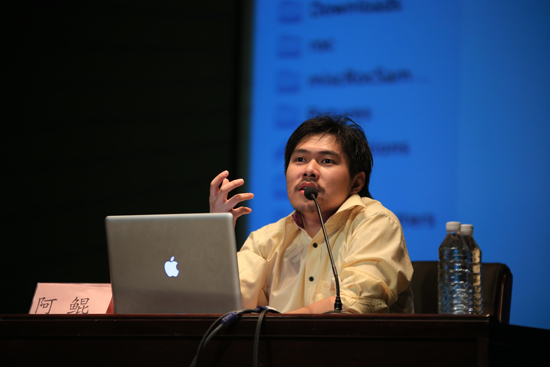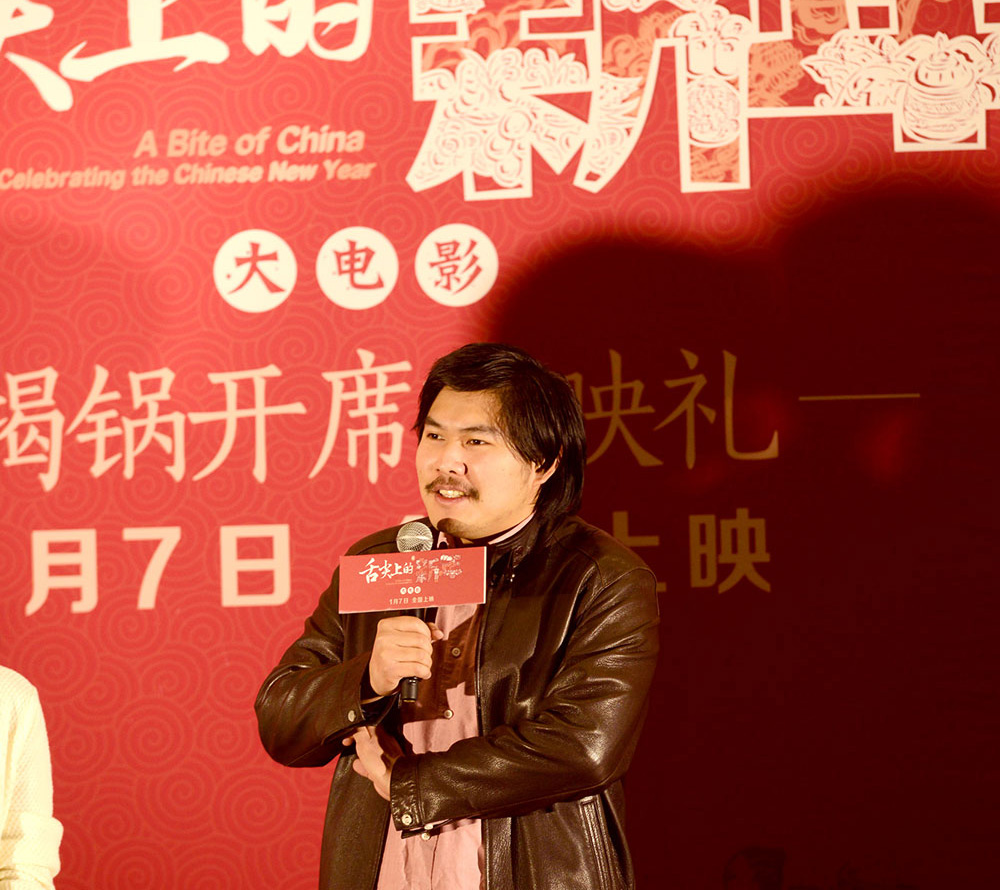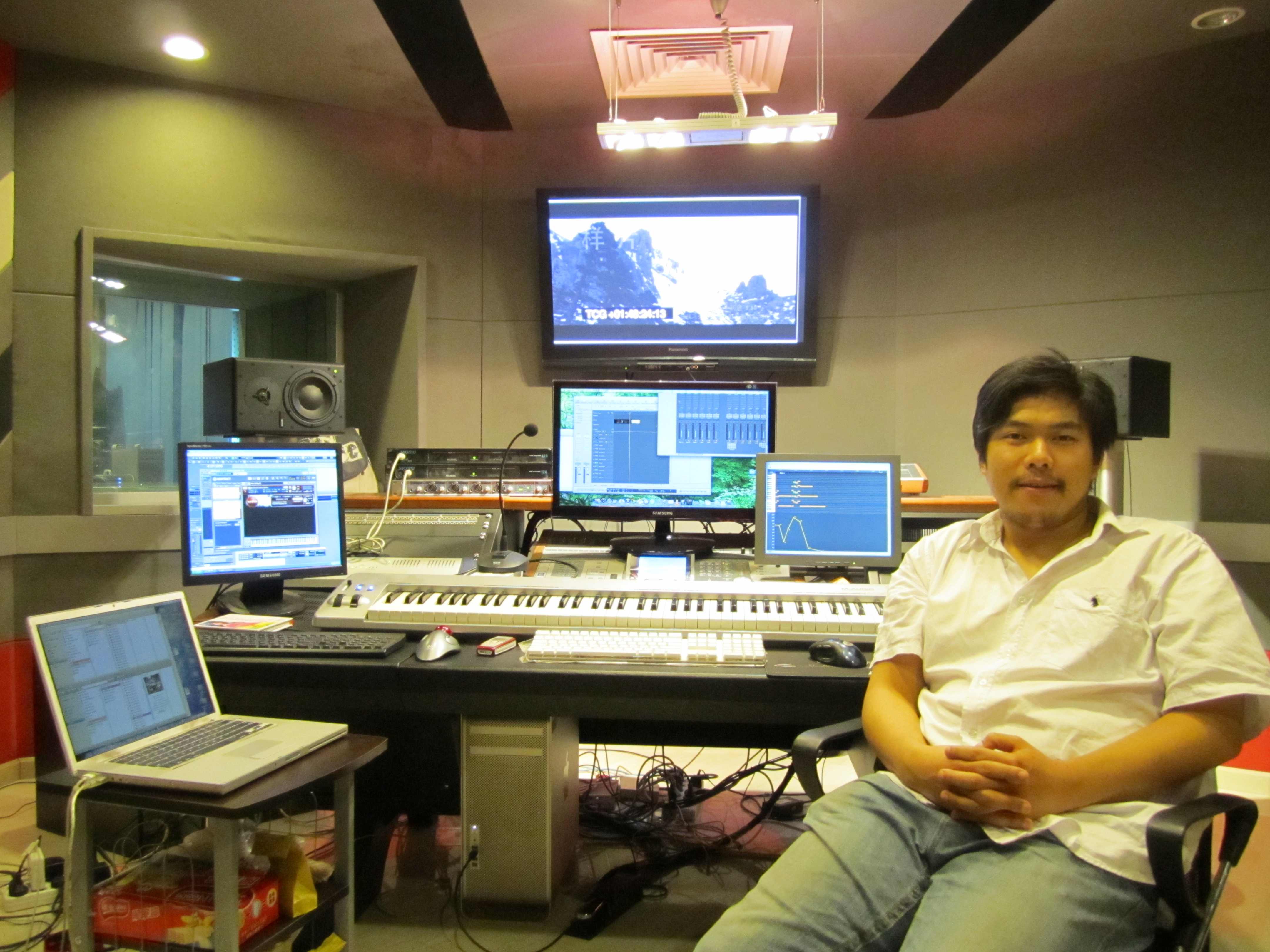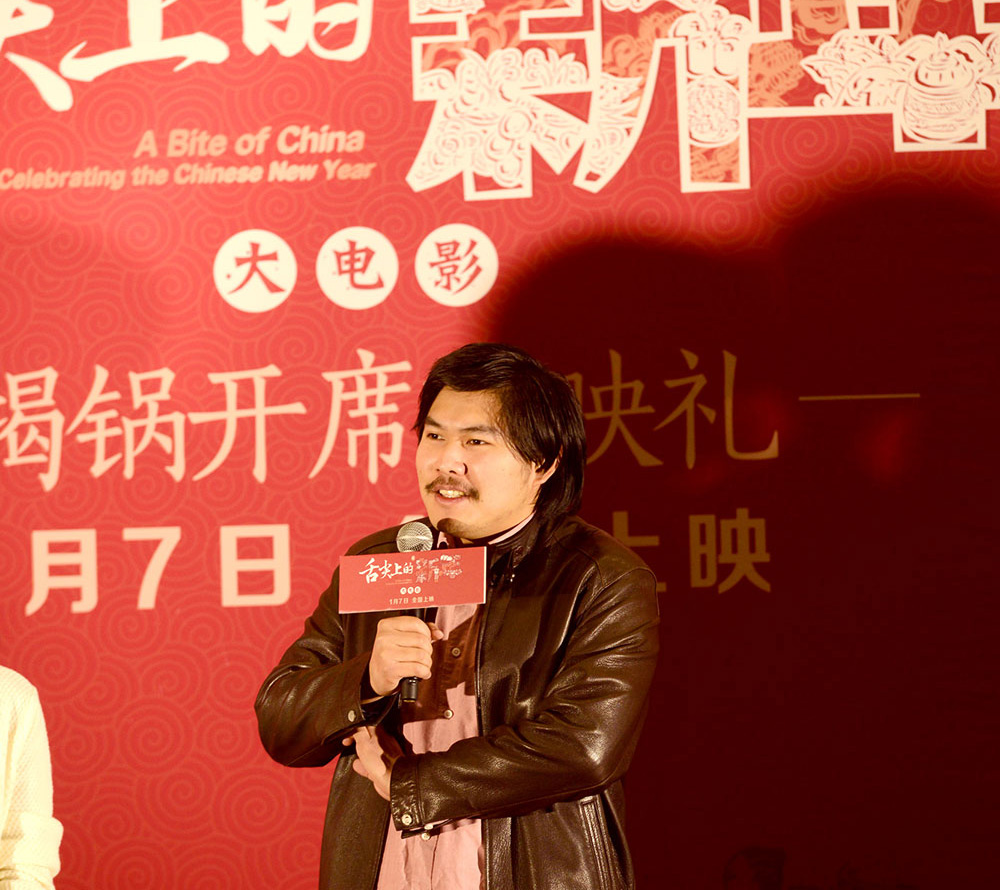
Roc Chen. Photography provided by CW3PR.
Roc Chen is a Sichuan-born, award-winning composer who has created music for film and gaming. Recognized within the U.S. and China, Chen’s music has the power and the beauty to bring cultures together from around the world, which is no easy task. His film roster includes “Chinese Zodiac” with Jackie Chan, “Forbidden Kiss” and the Chinese adaptation of “Everybody’s Fine” (American adaptation ft. Robert DeNiro). Roc also partnered with DreamWorks to create music for the film “Kung Fu Panda 3” — and his music is present in the award-winning, internationally broadcasted documentary TV series “A Bite of China.” Chen’s video game work even dabbles into “World of Warcraft” and “God of War” orchestras—as well as the “Might and Magic” series and his latest work underway with “Prince Adventures.” Recently partnering with Danny Elfman to bring music to Disney Shanghai’s newest ride, Alice’s Maze; Roc Chen’s music brilliantly celebrates the fusion of the American storyline of Alice in Wonderland with Chinese culture native to the Shanghai location.
This summer Roc Chen was interviewed by Nicolette Mallow. The two discussed his background in music, technology, and the power of music and how it can feel like time traveling. Mallow also inquired about the challenges and rewards of merging Eastern and Western cultures for film, Disney, DreamWorks and much more. And Chen opened up about how his music can be like an invisible, magic mirror that reflects everything inside the listener’s heart. The written interview proceeded as follows.
Nicolette Mallow: Will you please tell me about your background in music? Did you always know that music composition was your life calling? When did you begin to play music and write music? As a child, what did music feel like?
Roc Chen: When I was a kid, sometimes I woke up in the middle of the night humming the melody from “The Godfather,” and I thought to myself, “Maybe I should be a film composer when I grow up!” Like many kids, I learned to play classical piano at the age of 4, but unlike many kids, I loved to keep the sustain pedal down to create a bigger reverberation (just like in film scores). And, of course, my piano teacher would always get mad at me for doing that. I’ve always known music, especially film music – it’s my life calling. However, I spent my college life in what is considered a Chinese Stanford (University of Science and Technology of China). We had a large and great orchestra band there and the conductor asked me to be the assistant conductor, so I’ve had the chance to learn from each and every different instrument – not from a book but from a real orchestra band. Later on I also obtained a Master’s Degree in Composition from the Conservatory of Music. I consider myself pretty lucky to have a background in both music and technology!
NM: Art has the power to take us places, particularly music. Music can take listeners back in time within seconds. Music can evoke feelings or fantasies within us and it’s almost like time-traveling… What do you feel are the most powerful components of music that allow us to transcend time, space and imagination?
RC: All the components of music such as melody, harmony, counterpoints are powerful enough to allow us to transcend time, space and imagination—but personally I think the most powerful one is the abstract part within the music. Pop songs take us into a specific world because the lyrics/words are quite specific and straight-forward. But instrumental music such as film scores without any lyrics or words are abstract, so it takes people to their own and unique places, to the different secret places deep within each person’s heart. This is also the beauty of scores. Film scores, though there are specific picture/scenes synced with it, can allow us to re-create those scenes and characters in our own way when we hear music outside of the cinema. It’s like everyone is a director and everyone directing his own version of that film in his brain. This is the beauty of film scoring. And of course, there are certain skills and ways to evoke those feelings or fantasies in the way of composition.
There’s a music piece of mine, “Deep in Their Hearts,” originally composed for the most renowned documentary in China called “A Bite of China Season 2”. It has moved nearly a billion people in China and around the world. I tried to tenderly and beautifully play the piano with a melancholy and nostalgic melody. It was performed by beautiful strings, woodwinds, with some abstract inside harmony, fine orchestration and counterpoint. The result is this music cue, which has moved lots of people and has surpassed pop songs to reach the top of the Chinese billboard. Thousands of fans came to my Chinese Twitter to express their feelings hearing this music to me and it’s actually quite interesting to read those comments. Some people say it reminds them of their childhood loneliness; some say it reminds them of some moving moments in that documentary; some people say it makes them cry with happiness. Some people say the woodwinds in this cue are funny and playful. It’s all different – and I feel like my music is like a mirror – each person saw and found their secret place deep in their heart by hearing this magical mirror.
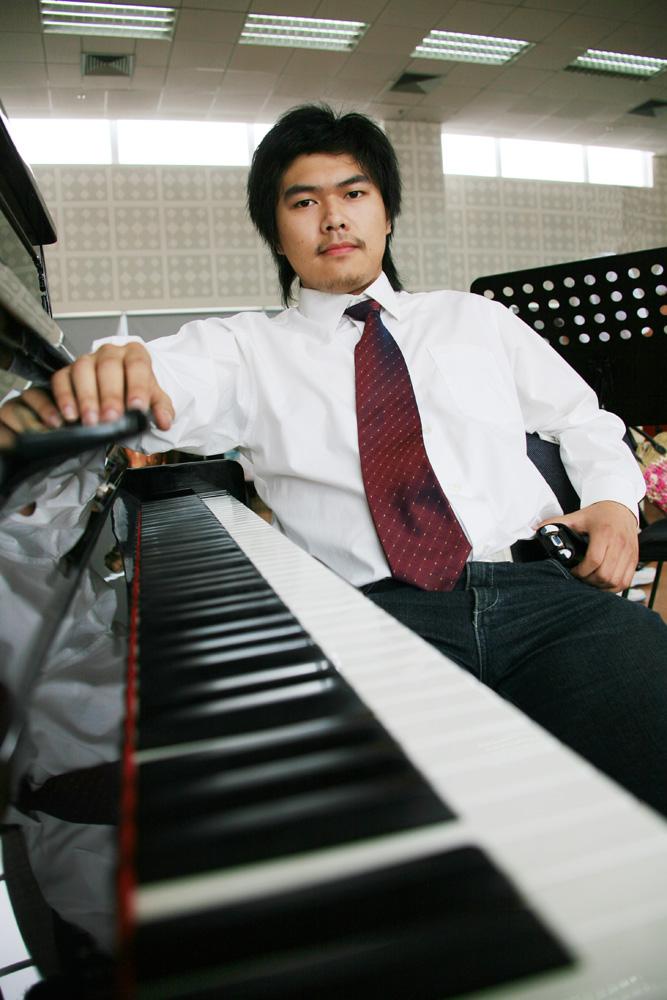
Roc Chen. Photography provided by CW3PR.
NM: What are some of the distinct differences between Eastern and Western music styles pertaining to film?
RC: Well, this is a little bit of a huge topic that I could talk about for days and write a book about. The scale of notes and melodies are different between the eastern and western worlds. Still, as for the relationship between music and film: I think one of the most distinct differences is the eastern style is more implicit while western style is more straight-forward and passionate. As I’ve been traveling between LA and Beijing a lot, I also found this difference within people’s behavior between the two countries. I guess one of the benefits of my goal as trying to be the most international composer is I can always get to know more about people from both worlds.
NM: Would you please share with me the challenges of integrating Eastern and Western music? Is it difficult to please both audiences?
RC: Many Hollywood films with pure western music are also enjoyed by lots of eastern audiences, but most of this music hardly reaches their hearts. So sometimes with only a few elements from the East can really move the eastern audience and ironically enough it moves the western audience too! Also, each film project is different and I’m always very careful with this challenge by always listening to the director’s ideas regarding the direction of the film. I always offer my suggestions and opinions on the direction of music but I would respect my director’s opinion because it is the film – a combination of many arts. It’s a whole project we’re going to present to the audience, not just music. There’s a project I did, “Heroes of Might and Magic VII,” the 7th game of the famous “Heroes of Might and Magic” video game franchise. I write some of the cues in a pure-western style and some cues have a little bit of East and West combined flavour. It all depends on the specific occasion.
NM: What lead you to work for Disney Shanghai?
RC: I guess people loved what I did for “Kung Fu Panda 3” as a Chinese music consultant, and then I got introduced to Disney by my friends at DreamWorks. But really, I think it’s because of my specialty of knowing both East and West which lead me to work for Disney Shanghai.
NM: In regards to Asian American crossroads within the entertainment industry – how did you begin to infuse the American storyline of “Alice in Wonderland” with Chinese culture native to the Shanghai location of Disney?
RC: First of all, it’s always teamwork! It is done by Danny Elfman, myself and another beautiful lady from Disney Imagineer. We put Chinese lyrics such as the translation of “Alice Are You Lost” and other lyrics written initially by Danny into the melody and make sure it really sounds great in Chinese. A lot of times, you’ll hear directly translated songs sounding very, very weird after translation. This requires a lot of experience of the Chinese culture and customs along with musical experience of the tone, pitch and rhythm of each note and its relationship between other notes. We tried many different ways to avoid a common phenomenon in Chinese music which is called “Dao Zi,” meaning the pitch of the notes will not violate or conflict with the tone of the Chinese words. I also had my female choir friends at Beijing singing the melody in Chinese beautifully while we remote-recorded them here in Los Angeles. We also did a lot of tweaks during the recording session.
NM: Do you have a favorite genre of music that you love to write? You are talented at composing many forms of music. But do you have a favorite style?
RC: Well… It’s really hard to pick one favorite style for me as I’ve worked in a lot of different styles and genres. But my favorite one is the one that best supports the film. As long as the form of music can do a good job to support the camera and film – that’s my favorite!
NM: Your career is most impressive and I have watched many of these films. However, I must admit that I have a fondness for “Kung Fu Panda”… Was that your first time writing music for animation? What did you enjoy most about this DreamWorks project?
RC: With this film, Hans Zimmer is the music composer while I worked alongside him as the Chinese music consultant. I offered direction and guidance on the Chinese instruments, Chinese musicians, the articulations and specialty of Chinese instruments. I also consulted on how to combine the instruments with Western orchestra music to the DreamWorks music team. I enjoyed turning the song of the last scene of “Kung Fu Panda 3” into Chinese and recording 40 amazing pop choir singers from Shanghai so when the film was released. Everyone could hear the final product of “animal” singing in Chinese happily in the end scene!
NM: Do you have any upcoming projects you’d like to highlight?
RC: I just finished recording with an orchestra in Nashville for a new animation feature I scored, and I’m also going to score some new exciting feature films, animations and TV series but due to NDA reasons I’m sorry to say I can’t disclose them right now.
NM: Lastly, I grew up reading the book “Joy Luck Club” by Amy Tan about four Chinese American immigrant families living in San Francisco. It’s a bittersweet, tragic and beautiful story that I still enjoy reading in adulthood. Since I was a child, I’ve always been fascinated by the history of China and I hope to visit someday. And of course when the movie came out I enjoyed the soundtrack. My point in mentioning “Joy Luck Club” is because for years, I’ve always wanted to learn more about the roots of classical music in China. But I never know where to start… Is there a book you’d recommend or a certain time period to study for those who want to learn about the roots of music in China?
RC: This is a great question! But frankly, I personally think the best book of Chinese music history or Chinese musicology is not in English but in the language of Chinese. Just like if you wanted to learn the western musicology: you’ll have to read that greatest musicology book in English. When I was in the Conservatory of Music, there was a school book called “History of Chinese music” which nearly covers all different kinds of music from pre-Qin Dynasty times, to Tang Dynasty music, to Qing Dynasty and even modern music of China. It also covers the musicology of a lot of different areas of China such as the music from the north of China – which is so different from the south of China. Music from HeBei Province is also so different from the music from the ShanXi province or the ethnic Uygur group in Xin Jiang areas. I have this book in my Beijing studio and I’ve always wanted to purchase an English-translated version to keep in my Los Angeles studio. Without any luck, I Googled and searched Amazon and didn’t find this book or any book just as great. Maybe some book publisher could work with me to translate a classic book into a new one in English. For those who want to learn about the roots of music in China, most people will probably say the Tang Dynasty is the best time period to study as it is one of the most brilliant time for all kind of arts. But I would personally recommend the eras around the Qin Dynasty such as the Three-Kingdom era, Warring States period, etc. If you research it and dive deep enough, you’ll see music in those ages are clearly fundamental not only to Chinese music, but also to the music of the Eastern world.
